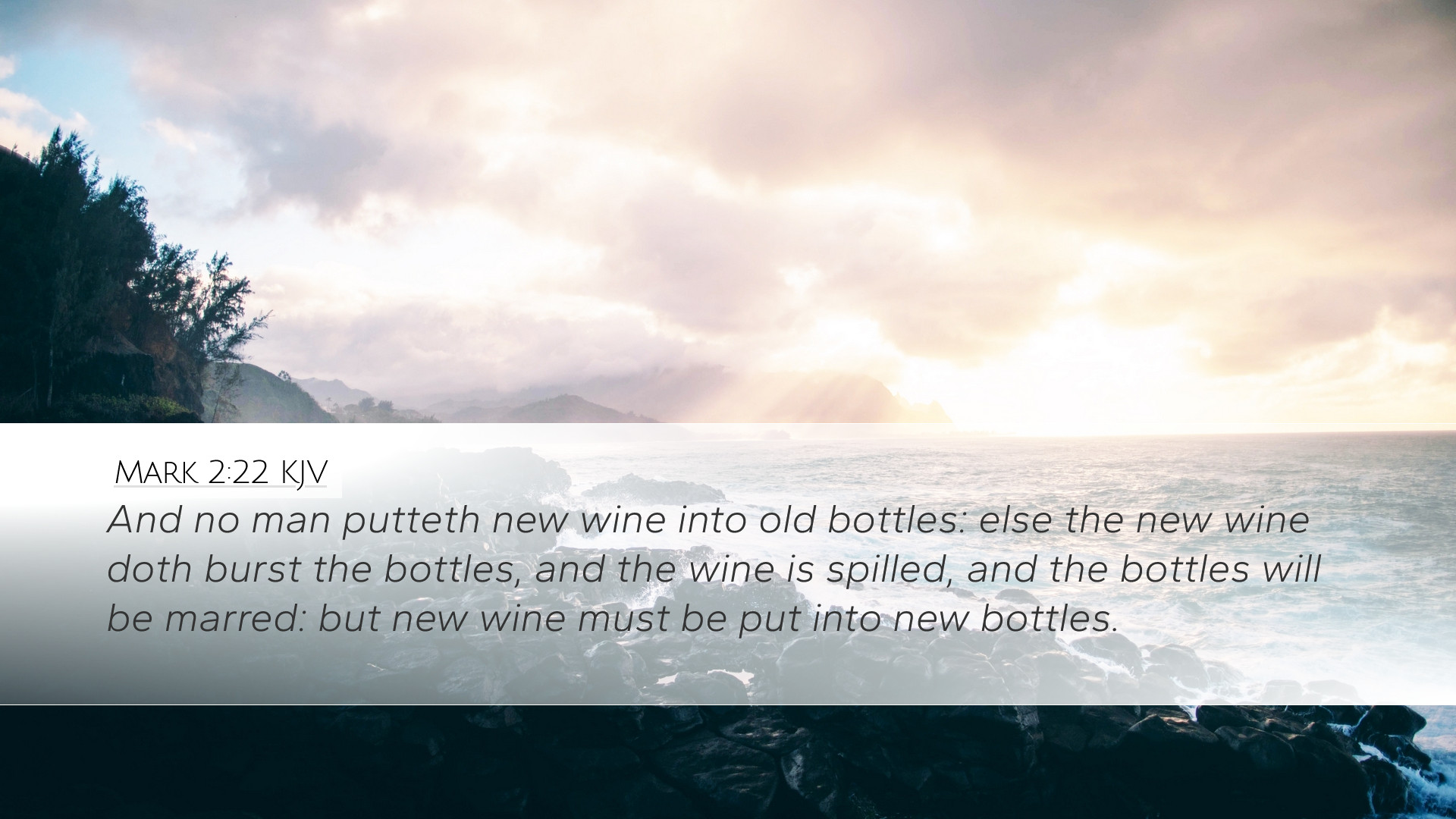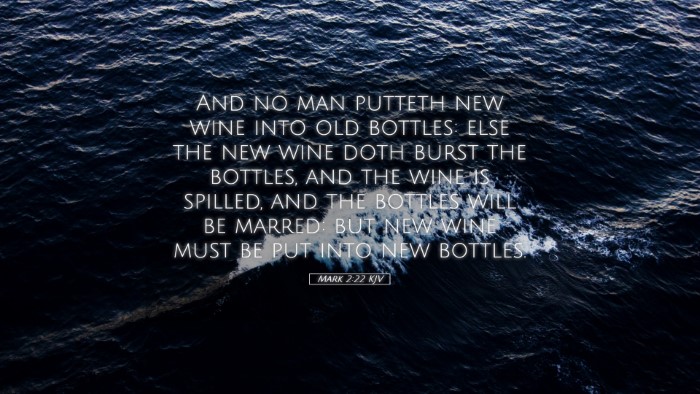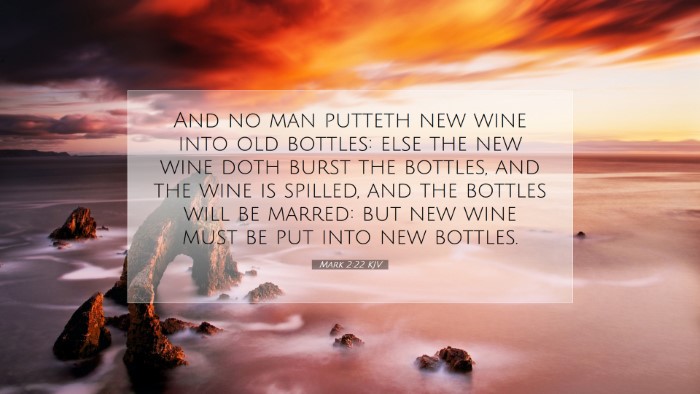Old Testament
Genesis Exodus Leviticus Numbers Deuteronomy Joshua Judges Ruth 1 Samuel 2 Samuel 1 Kings 2 Kings 1 Chronicles 2 Chronicles Ezra Nehemiah Esther Job Psalms Proverbs Ecclesiastes Song of Solomon Isaiah Jeremiah Lamentations Ezekiel Daniel Hosea Joel Amos Obadiah Jonah Micah Nahum Habakkuk Zephaniah Haggai Zechariah MalachiMark 2:22
Mark 2:22 KJV
And no man putteth new wine into old bottles: else the new wine doth burst the bottles, and the wine is spilled, and the bottles will be marred: but new wine must be put into new bottles.
Mark 2:22 Bible Commentary
Commentary on Mark 2:22
Bible Verse: "And no one puts new wine into old wineskins. If he does, the wine will burst the skins; and the wine is destroyed, and so are the skins. But new wine is for fresh wineskins."
Introduction
This verse presents a significant metaphor illustrating the necessity of new approaches and attitudes in the ministry and personal faith. The cultural context of first-century Judea, combined with the theological implications, provides a rich field for analysis. Various public domain commentaries offer insights that can deepen understanding and application of this verse.
Contextual Analysis
Mark 2 captures a pivotal moment in Jesus' ministry where He challenges the established norms of Jewish religious practices. The setting involves Jesus dining with sinners and tax collectors, prompting criticism from the Pharisees. This confrontation sets the stage for the teaching found in verse 22.
Matthew Henry's Commentary
According to Matthew Henry, this verse metaphorically contrasts the old Jewish religion with the new covenant brought by Christ. He emphasizes that Jesus is introducing a new way of relating to God, which cannot be contained within the old traditions and practices. Henry notes:
- Old vs. New: The imagery of old wineskins represents the rigid structures of the Mosaic Law and the prevalent practices of Pharisaic Judaism, which are unsuitable for the vibrant life of the new covenant.
- Transformation: True transformation requires a reorientation of understanding – one that allows for the dynamic nature of faith to flourish.
Albert Barnes' Commentary
Albert Barnes further expounds upon this metaphor by discussing the properties of wineskins. He notes that wineskins, like religious structures, must be flexible to accommodate the fermentation process. Barnes points out:
- Endurance of New Wine: New wine, which is fresh and full of life, necessitates new wineskins, indicating that the renewing work of the Holy Spirit cannot thrive in old religious contexts.
- Application: Barnes encourages reflection on our own lives and churches: are we flexible enough to embrace the new things God wants to do?
Adam Clarke's Commentary
Adam Clarke presents a theological reflection on the implications of this teaching. He focuses on the active participation required to receive and sustain new revelations from God. Clarke articulates:
- Spirit of Renewal: He highlights the necessity for believers to be prepared to adapt to God’s work, reflecting that spiritual growth often involves discarding old mindsets and practices that become counterproductive.
- Community Transformation: Clarke suggests that this principle extends beyond personal faith; churches and communities must also be willing to make changes to engage meaningfully with the gospel.
Theological Implications
This verse invites important theological reflections. The old wineskins metaphor showcases the tension between tradition and transformation in the Christian faith. Here are some key implications:
- New Covenant Theology: The transition from the old covenant of the Law to the grace of the New Testament is a central theme, showing that Christ's message cannot be constrained by previous religious forms.
- The Role of the Holy Spirit: The necessity of the Holy Spirit’s work in believers' lives supports the idea that growth and renewal are divine tasks that require openness to God’s leading.
- Church Practice: The passage urges the church to be mindful of its practices; traditions that do not support the dynamic movement of the Holy Spirit can hinder growth.
Application for Today
For pastors, students, theologians, and scholars, Mark 2:22 carries profound implications for contemporary ministry and personal faith. The following applications emerge from this commentary:
- Evaluate Church Structures: Leaders are encouraged to critically assess church structures and modes of worship. Are they hindering or facilitating the work of the Holy Spirit?
- Embrace Change: Faith communities must cultivate a culture that welcomes innovation while remaining rooted in Scripture, allowing God to lead them into new expressions of faith.
- Personal Renewal: Individually, believers should examine their hearts for old patterns of thinking and behaving that may inhibit their spiritual growth. Embracing new truths revealed in Scripture is essential.
- Focus on Relationships: As Christ demonstrated, ministry must be relational. Engaging with those on the margins and creating space for new members is vital for vibrant church life.
Conclusion
Mark 2:22 serves as a reminder of the necessity of adaptability in our spiritual lives and ministry practices. By drawing from the insights of Matthew Henry, Albert Barnes, and Adam Clarke, we are prompted to reflect on our own experiences with faith and tradition. The metaphor of new wine and new wineskins encourages us to seek God’s will actively and embrace the transformative work He desires to accomplish within us and through us.


